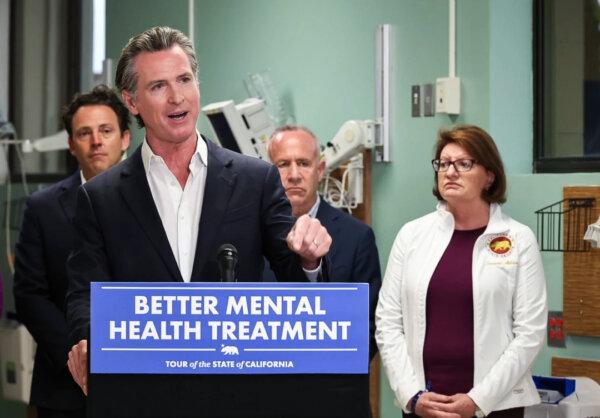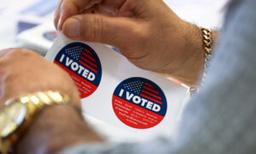California voters have narrowly approved Proposition 1, meaning the state’s mental health and behavioral health system is set to undergo a dramatic restructuring for the first time in 20 years.
The Associated Press called the result with 50.2 percent of voters approving the measure versus 49.8 percent voting against.
Still, the vote won’t be certified until April 12.
Proposition 1 is made up of two bills and has been heavily promoted by Democrats under the tagline “Treatment Not Tents.”
It was the only statewide measure on California’s ballot two weeks ago when Golden State voters took to the polls on Super Tuesday.
The measure amends the Mental Health Services Act to provide additional behavioral health services across California, according to a press release from Gov. Gavin Newsom, who approved the measure in October 2023 and has made it a priority since then.
It also approves a nearly $6.4 billion bond to build more housing and treatment facilities for people with mental health, substance abuse, and alcohol disorders, including more than 11,150 new behavioral health beds and housing for 26,700 outpatients, according to Mr. Newsom’s office.
Additionally, Proposition 1 will impose strict requirements on counties, which will now be required to spend about two-thirds of the money from a voter-approved mental health services tax enacted in 2004 on housing and programs for homeless people with serious mental illnesses or substance abuse problems.
The measure also provides $1 billion to serve veterans experiencing homelessness, mental health, and substance abuse issues; address the shortage of mental health workers; prioritize treatment, not punishment, for mentally ill incarcerated individuals; and prioritize getting people off the streets and into treatment, according to Mr. Newsom’s office.
Supporters of the bill include California Professional Firefighters, the California Association of Veteran Service Agencies, and the National Alliance on Mental Illness.
Opponents Fear Proposition Will Worsen Crisis
The ballot count of Proposition 1 took so long that Mr. Newsom postponed his annual State of the State address, originally scheduled to take place on March 18. The governor has not yet said when, or if, he will hold a new address.In a statement after Proposition 1 was approved, the Democrat called it “the biggest change in decades in how California tackles homelessness, and a victory for doing things radically different.”
“Now, counties and local officials must match the ambition of California voters. This historic reform will only succeed if we all kick into action immediately—state government and local leaders, together,” Mr. Newsom said.
While early polling suggested Proposition 1 would easily pass, it soon became apparent that the measure was a deeply divisive issue in a state that has already splashed out billions to tackle the ongoing drug crisis and accounts for nearly a third of the homeless population in the United States. Roughly 181,000 Californians are in need of housing.
While Mr. Newsom had touted the reforms under the measure as a way to “re-focus billions of dollars in existing funds to prioritize Californians with the deepest mental health needs, living in encampments, or suffering the worst substance use issues,” opponents have argued Proposition 1 will take funding away from community-based cultural centers, voluntary crisis care, and other critical mental health services and vocational services while also pitting those programs against services for the homeless.
Opponents, including the American Civil Liberties Union (ACLU) of Northern California, further argue the measure will result in forced treatment and institutionalization under the CARE Court, which allows relatives, health care providers, and other outreach workers to ask state courts to compel individuals with severe mental illness or abuse disorders to accept treatment.
“Though touted as a solution to houselessness, according to the Legislative Analyst’s Office, Proposition 1 would provide housing for only about three percent of the total number of Californians who are unhoused on any given day,” the ACLU wrote in a Feb. 16 statement.

California Gov. Gavin Newsom announces a proposed 2024 ballot initiative to treat people at risk of homelessness and with mental illness and drug addiction across the state at Alvarado Hospital in San Diego on March 19, 2023. (Courtesy of Office of Governor Gavin Newsom)
“With enormous cost to taxpayers, Proposition 1 would also impose a new $6.8 billion bond to primarily fund forced treatment and institutionalization—not the community-based mental health services and housing” that Californians need to “avoid more expensive, restrictive, coercive, and often traumatizing interventions,” the advocacy organization said.
Fears Over ‘Involuntary Institutionalization’
Elsewhere, disability rights advocates, also citing concerns over involuntary institutionalization, argued against the measure.Katherine Wolf, a doctoral student with mental health and physical disabilities, wrote a blog post for the Disability Visibility Project urging voters to reject Proposition 1 earlier this month, stating that the measure “exploits widespread prejudice against people with mental health disabilities to lock up victims of California’s affordable housing crisis under the guise of care, while cutting funding from effective, voluntary, community-based mental health services.”
“Replacing voluntary community services with involuntary institutionalization disregards evidence-based practices in mental health and substance use disorder (SUD) treatment, increases mistrust of medicine, and facilitates discrimination against the most marginalized among us,” she wrote.
According to data cited by Deadline, Los Angeles and the Bay Area turned out to be strongholds for support of Proposition 1, while Orange County and the Inland Empire—a metropolitan region encompassing Riverside and San Bernardino counties—were predominantly against the measure.
Proposition 1 marks the first update to the state’s mental health system in 20 years.
Approval of the measure comes as California is facing a growing budget deficit of $73 billion after tax revenue failed to meet expectations, according to the state’s nonpartisan Legislative Analyst’s Office.
On March 20, Mr. Newsom, state Senate President pro-Tempore Mike McGuire, and Speaker of the Assembly Robert Rivas agreed to budget solutions worth $12 billion to $18 billion to address that shortfall, the governor’s office announced.














